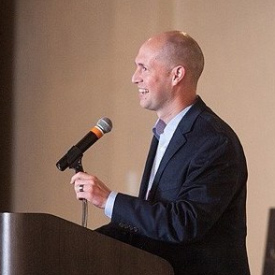Culture-Makers or Culture Warriors? (Part Three)
Need to get caught up on this series? Read part one or part two.
“I do not pray that You should take them out of the world, but that You should keep them from the evil one. They are not of the world, just as I am not of the world.” – Jesus (John 17:15-16)
As the divide between Church and culture deepened, the Church gave two replies – retreat and acquiescence. Refusing the progressive or liberal tendency to sanction the deeds and ideas of culture, more conservative minds drew back, creating increasingly small and divided subcultures. Liberals became “of the world” while conservatives refused even to be “in” it.
But this is only part of the puzzle. Disillusioned with the failed promises of modernity, the culture itself made a move, embracing the despair of postmodernism. Seeing the cracks in scientism and logical positivism, many, while holding fast to doubts about “absolute” truth, began to be more open to the life of the soul. Sadly, this has been, for the most part, a missed opportunity for the Church. The “liberal church” had embraced everything the culture was trying to leave behind, while the “conservative church” was in hiding.
Given postmodern culture’s cynicism towards truth and goodness, the importance of beauty is hard to overstate. Robert Royal observed that “where truth is assumed a priori not to exist, images and atmosphere will shape how most people think.” In other words, the spiritual searching of the postmodern does not typically follow lines of dogma or argument, but beauty and image. They are seeking, if that is the word I want, for something beautiful; something to counter the coldness and ugliness of modernity.
The Christian reply has been quite weak, for the most part. While there are encouraging signs that Christians are again taking the imagination and the arts seriously, there is much work still to be done. Conservative Christianity finds itself deeply rooted in the subculture mentality and, as a result, would rather establish “Christian” everything – clothing, publishers and books, record labels and music, etc. – than actually engage with the culture. And, what’s far worse, this subculture mentality fuels the creation of politicized, ideological art – books that lack imagination, art that tells but doesn’t show, music that blends trite content with non-matching forms. Put more directly, so much of contemporary Christian art stinks because it plays to uncritical, friendly audiences who prefer sentimental uplift to quality art.
Whenever Christians are taught to engage culture, it is through a kind of guerilla warfare – a direct evangelism fueled by the structured, logical arguments of apologists. We have combined cultural retreat with evangelism, somehow attempting to be neither in the world (in any substantive sense) nor of it. The effect of this strategy is seen in the culture’s response to modern Christianity – mockery of our “art”, dismissal from cultural dialogue, and suspicion of our occasional forays into the world. Having preferred culture-warring to culture-making, we have reduced “culture” to mere politics and ideology which, as Gregory Wolfe wrote, “is like constantly spraying insecticide and never watering or fertilizing the soil.”
Yet, the idea that beauty could bring about cultural change or even cultural influence seems either far-fetched or impractical to the modern Christian or conservative mind. Wolfe argues,
“Conservatives have, by and large, focused their energies on political action and the theoretical work necessary to undertake action. The indirection of art, with its lack of moralizing and categorizing, strikes the pragmatic mind as being unedifying, and thus inessential. Insofar as the great artists and writers of the past are admired, it is for their support of some idea, rather than for the complex, many-sided vision of their art.”
Christians seem to distrust the imagination because its results are not direct or “guaranteed” like those of logical argument.
What, then, are we to do? How does the Christian community go about correcting such missteps? While this discussion cannot readily be reduced to bullet points or “action items,” there are several thoughts and changes we must consider. Christians must take time to contemplate what it means to love the world. How can we be “in” it in substantive, engaging, meaningful ways, while not falling to the progressive error of becoming “of” the world? I fear these issues have received only pat answers, generally falling along political and ideological lines. We ought to read those who challenge the typical answers – Gregory Wolfe (whose writings, any reader of this trilogy of articles can tell, have greatly challenged my own thinking), Andy Crouch, Dorothy Sayers, Flannery O’Connor, to name a few.
Furthermore, we must realize the great weakness and danger of our tendency towards “action” rather than contemplation. What has the conservative and Christian dependence on politics and “social action” gotten us? To quote Gregory Wolfe once more:
“For Christians, the idea that contemplation and prayer ought to precede action should be second nature. How many of us have become unwitting disciples of Marx, who said that ‘up till now it has been enough to understand the world; it is for us to change it’? Marx’s preference for revolutionary action over the classical-Christian belief in the primacy of contemplative understanding of transcendent order lies at the heart of modern ideology.”
Finally, in direct application to classical educators, we must make sure that as we equip our students with the tools of logic, that they are used for more than argument; that as we train them in rhetoric, it is used for more than debate. The goal of classical education is not that we send students through the gauntlet of the trivium, but that they love and, therefore, live truth, goodness, and beauty; that they love wisdom and virtue; that they live to persuade, not as a subject or discipline, but as a life.

Brian Phillips
Dr. Brian Phillips serves as a pastor in Concord, NC, where he lives with his wife and their four children.










